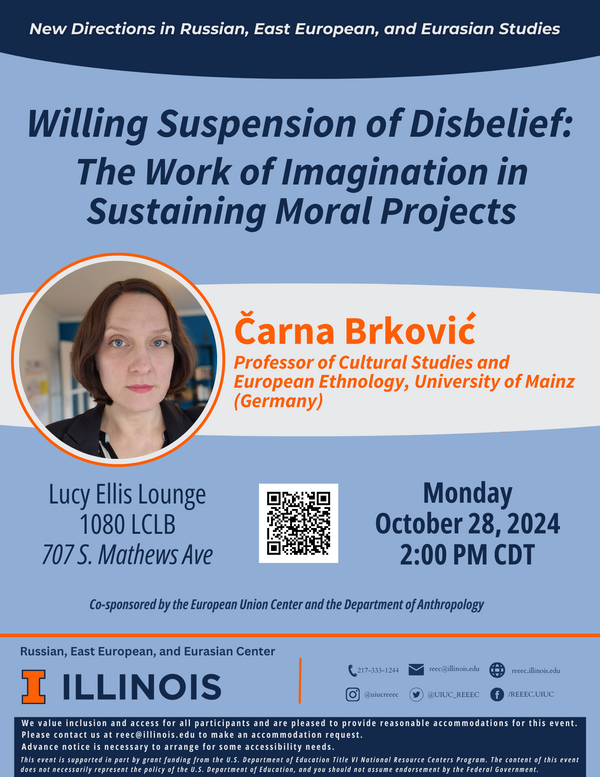
REEEC New Directions Lecture: Čarna Brković: "Willing Suspension of Disbelief: The Work of Imagination in Sustaining Moral Projects"
- Event Type
- Lecture
- Sponsor
- Russian, East European, and Eurasian Center; European Union Center; Department of Anthropology
- Location
- Lucy Ellis Lounge (1080 LCLB)
- Date
- Oct 28, 2024 2:00 pm
- Speaker
- Carna Brkovic (Professor of Cultural Studies and European Ethnology, University of Mainz)
- Cost
- Free and open to the public.
- Contact
- REEEC
- reec@illinois.edu
- Views
- 281
- Originating Calendar
- Russian, E. European & Eurasian Center: Speakers
This talk will consider strategies of imagination that local humanitarians who worked in the same refugee camp in Montenegro for almost two decades used to continue their moral project in spite of many disappointments. Drawing from socialist Yugoslav as well as contemporary European imaginative repertoires, local humanitarians invested interpretive labour to explain the world, themselves, and others to one another. They did this to rediscover the meaning of their work in the midst of major social changes (including postwar and postsocialist transformations and Europeanisation). Yet, this interpretive labour did not involve an attempt to take a look at the things from the perspective of the residents of the refugee camp – imaginative identification. Instead, it was founded upon an act of ‘suspending disbelief’ in the meaning and purpose of humanitarian work. In doing so, this humanitarian moral project worked towards cultivating a world in which the target of the intervention was the ‘interiority’ of the displaced people, and not the material and economic structures shaping their lives. By emphasizing the relevance of interpretive labour for sustaining moral projects in the midst of social transformation, this talk will explore how we might conceive of moral reasoning as a shared and collective practice of choosing the kind of a world to work towards (rather than just as an act of choosing what kind of a moral self to become).
Čarna Brković is Professor of Cultural Studies and European Ethnology at the University of Mainz, Germany. Her first book, Managing Ambiguity (Berghahn, 2017), is an ethnographic study of vernacular humanitarianism and medical crowdsourcing in Bosnia and Herzegovina. She is currently completing a book manuscript titled “Worldmakings: Realigning Humanitarianism from Yugoslav Socialism to Neoliberal Capitalism in the Balkans”, which offers an historical account of how the fall of Yugoslav socialism has changed the humanitarian project between the 1970s and the 2010s.